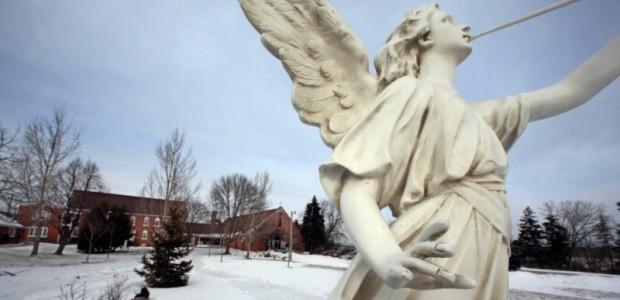By Doug Erickson
Wisconsin State Journal
October 23, 2011
http://host.madison.com/wsj/lifestyles/faith-and-values/religion/article_c42389c0-fc08-11e0-a4db-001cc4c03286.html
 |
| While in town last week for a series of events as a visiting fellow of the Lubar Institute for the Study of Abrahamic Religions at UW-Madison, Carroll took part in a wide-ranging Q&A Monday at a gathering of campus faculty and area clergy members. |
James Carroll was ordained a Catholic priest in 1969, then gave
up the priesthood a short five years later.
Those were turbulent years — for Carroll and for the country.
As a chaplain at Boston University, he was a self-described
"radical priest" and anti-war activist, opposing U.S. involvement
in Vietnam. His 1996 memoir, "An American Requiem: God, My Father,
and the War that Came Between Us," covers that difficult journey
and won the National Book Award.
Carroll, 68, a columnist for The Boston Globe, was in Madison last
week for a series of events as a visiting fellow of the Lubar
Institute for the Study of Abrahamic Religions at UW-Madison. While
the institute's invitation was due largely to his recent writings
on interfaith dialogue, Carroll took part in a wide-ranging Q&A
Monday at a gathering of campus faculty and area clergy members.
Some excerpts:
• On the value of interfaith dialogue among Jews,
Christians and Muslims: "We don't gather to politely
affirm each other. Ideally, we reckon with the failures of our own
tradition in the presence of the other, learning from the other
what those failures are and have meant. That's the power of it for
me."
• On atheists' claims after 9/11 that only religion could
lead human beings to do something so horrific: "On the
face of it, the simple affirmation that something that monstrous
could only have been done by someone acting on religion is, of
course, denied by history. However you regard the neo-paganism of
the Nazi movement, which was not a religious movement, or however
you regard the staunch atheism of the Stalinist regime, the truth
is the shock of 9/11 was world-historic, perhaps, but on the scale
of violence, it was child's play compared to any number of other
acts of violence — some of the most, if not the most, of which have
been committed by self-avowed atheists.
• On mixing church and state: "The great
temptation for Christians and Muslims both has been the use of
state power to advance religious purpose. When it has been done,
bad things have happened — to the religion as well as to the people
on whom the power was exercised. The Catholic Church in particular,
but the Protestant tradition as well, has had a hard time coming
into modernity with an important affirmation of the importance of
the separation of church and state."
• On being called a "Catholic hater" for his criticism
of the Catholic hierarchy: "If I'm a Catholic basher, what
are the bishops who have been protecting pedophile priests? They're
the real Catholic bashers. Those of us who defend the theology and
practices of the Second Vatican Council are, to certain
conservatives, always going to be Catholic bashers, but it's not
true."
Contact: derickson@madison.com
Any original material on these pages is copyright © BishopAccountability.org 2004. Reproduce freely with attribution.